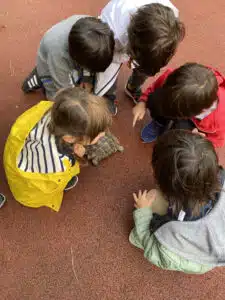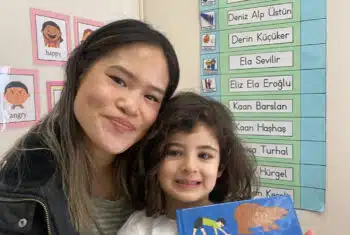Things To Know About Turkish Classroom Culture
Join a global community of over 200,000 TEFL teachers working throughout the world! Enrol me!
If you’ve spoken to any TEFL teachers lately, they might tell you that Turkey is an undiscovered hotspot for teaching English abroad. Have you ever considered it? If you haven’t, maybe you should.
Perlie is a 28-year old TEFL teacher from the United States.She taught in the US and South Korea, but moved to Turkey on a whim with her boyfriend (our very own TTA alum Matt!).
Here she tells us how, in her own words, a move to a country I had never stepped foot in before and admittedly knew almost nothing about, both shattered my expectations and opened my eyes to a completely unfamiliar world.
We asked Perlie to chat to us about classroom culture in Turkey and what TEFL teachers can expect when teaching there.

What should teachers know about classroom culture in Turkey?
In Istanbul I taught pre-school students, so my work days were spent surrounded by 3 to 4 year-old students. Similarly to children of this age all around the world, these students require a lot of care and attention.
I was responsible for the majority of these students’ first-time transition into a school setting, teaching them basic social skills using constant positive reinforcement, and even introducing them to basic motor skills like putting their jackets & shoes on and using scissors properly.
As these children are so young, classes are limited to 15 students, and each classroom consists of two teachers — a Turkish teacher and an English teacher.
Read more: Co-Teaching In The EFL Classroom
At least at this age, the primary role of the Turkish teacher is to ease the transition of being immersed in a native English-speaking environment. As a result, I split classroom responsibilities and lessons with my Turkish partner teacher, half and half.
In contrast to all of my previous teaching experiences (and because these were the youngest students I had ever worked with), our school’s mission focused heavily on play rather than academics.
[This was definitely a breath of fresh air since my previous teaching assignment in South Korea was 100% focused on academics — completing workbooks, memorising and performing speeches, and excelling in exams.]
Essentially,Korean students spend hours stuck in a chair behind a desk every day. Turkish students, on the other hand, spend most of their days participating in facilitated play time, outdoor recess time, regular “nature days,” and field trips. These field trips were to nature parks to do scavenger hunts, theme parks, and even to a renowned football stadium.
To find out more about what it’s like teaching English in South Korea, read our blog post: Things To Know About Classroom Culture In South Korea.
Although this learn-by-play dynamic results in a lot less academic pressure on both the students and the teachers, I found that there is a lot more classroom management required in the classroom to remind the students that this is still a school and not indeed a playground.

How does Turkish classroom culture differ from the West?
In my personal experience, Turkish classroom culture doesn’t differ so much from the West.
As it is most of these students’ first time in a school setting, or in a social setting with other children, I taught them to always raise their hand before speaking and facilitate a lot of group-work activities to learn how to work harmoniously with others.
Perhaps it is due to their young age, but it is so lovely to have so many eager students that are so excited to participate, speak up during lessons, and be genuinely interested in classroom topics.
In terms of school culture, what interested me the most iss the fact that many teachers take smoke breaks while on campus at every chance they can get. Whenever they return from their smoke breaks, they smell heavily of smoke while in the classroom.
During video parent-teacher conferences, it is not uncommon for the parent to be smoking a cigarette while on call. As an American that grew up in only smoke-free campuses my entire academic life, this definitely took me by surprise.
Turkey has historically had high levels of smoking, particularly among males and from as young as high school. Laws were introduced in the country banning smoking in public places in 1996. While this has seemingly had a positive effect on younger people, the older generation are still known for the smoking habits.
How are students expected to behave?
Due to the students being such a young age, behavioural expectations are rather basic.
At the end of each trimester, teachers write descriptive report cards regarding both academic and social progression for each student. Criteria on the report card rubric includes:
- ability to share with others,
- to work harmoniously with a partner or group,
- to play fairly during games.
Additionally, students are expected to adopt appropriate classroom behaviour, such as being respectful to other students and following instructions.
How do students typically show respect for teachers?
Students know to respect their teachers by:
- calling them by their teacher titles (Miss or Mr. “teacher’s name”),
- asking for permission to use the bathroom or get something from their cubby,
- listening to classroom instructions, and
- calmly telling their teacher if a problem occurs with another student.
What’s the teacher-student dynamic like?
Although most of the classroom curriculum consists of playtime and “fun activities,” it is important to still maintain that authority figure as a teacher.
Students are to understand on the very first day of school to respect and listen to their teachers. Teachers must execute a healthy mixture of being their play buddy while also being stern with them when needed.
Are there any unexpected classroom routines?
Similar to American elementary schools and their regular morning assemblies which consists of pledging allegiance to the flag and singing the national anthem with the entire school, Turkish schools have frequent outdoor assemblies with the school anthem, all in Turkish.
Another part of the daily morning routine includs reviewing classroom rules, establishing “jobs” for each student, and discussing the weather and day of the week. Classroom rituals and routines are essentially the same as I’d previously been used to.
The one aspect that was new to me was their immense dedication to Atatürk, the founder of Modern Türkiye. Every single classroom is required to have a framed photo of him displayed on the wall. There was a giant bust of his head in the school garden, and there are several special days dedicated to him where teachers and students lay flowers around his bust. Students wear red shirts with his face and signature on it. This dedication to their country’s founder is a reflection of Turkish citizens of all ages, but I now understand first-hand how this dedication is instilled in them at such an early age.
Anyone who has taught any Turkish students has no doubt heard of Kemal Atatürk. Atatürk is considered the founding father of the Republic of Turkey and served as the first president from 1928 to 1933. He is widely revered in Turkey and he is omnipresent in both personal and public spaces.
How does academic pressure affect your students?
As the students were still so young and the mission of our school was to “learn by play,” academic pressure was not such an issue.
The students’ social skills are a much larger focus rather than their academic skills, and social progression is typically the topic of discussion with parents during conferences, as this is their main concern. Social skills are apparent in their ability to get along with and mitigate conflict with other students.

What are class sizes like?
Students remain in the same classroom with the same classmates and teachers every day.
Since there is a limit of 15 students per classroom for this age, my class consisted of 15 students. As students get older, classroom sizes grow larger.
What role do parents play in classroom expectations?
Since I was working in a rather prestigious private pre-school, parents were very heavily involved in their children’s academic lives.
Personally, this was one of the largest aspects to become accustomed to when I first became a pre-school teacher in Istanbul.
With bi-weekly phone calls with each parent, weekly Friday letters, three parent-teacher conferences in a school year, and even just chatting with parents during child pick-up time every day, teachers hve very frequent communication with parents regarding their children’s academic and social progress.
When there are specific social issues, such as bullying or difficulty adjusting to the classroom environment, parents can call the school and/or visit the school and have meetings with the teachers, principal, or guidance counselor.
One aspect of working at a private school is that they operate almost more like a business rather than a school. Parents sometimes treated teachers like they were entitled customers. Think “the customer is always right” type of mindset.
What do teachers wear to school?
Classroom attire and social attire differs greatly.
Although neither the teachers nor students wear school uniforms, teachers wear semi-formal clothes that are rather conservative.
One small difference I picked up was the ban of open-toed shoes, whereas teachers in the US commonly wear sandals and teachers in South Korea are actually required to wear indoor slippers in the classroom.

Any tips for teaching in Turkey?
Teaching in a Turkish classroom can be an incredibly rewarding experience, but it also comes with its own set of cultural nuances and expectations.
As is the motto for anybody moving to a different country to teach, it’s important to keep an open mind to differences in culture amongst both colleagues and students. Behaviours could come across as rude or offensive at first, but it may very well be completely normal and harmless in their culture.
Accreditation & Quality Assurance
The TEFL Academy was the world’s first TEFL course provider to receive official recognition from government regulated awarding bodies in both the USA and UK. This means when you graduate you’ll hold a globally recognised Level 3 (120hr) Certificate or Level 5 (168hr) Diploma, meaning you can find work anywhere and apply for jobs immediately.
 United States
US
United States
US















